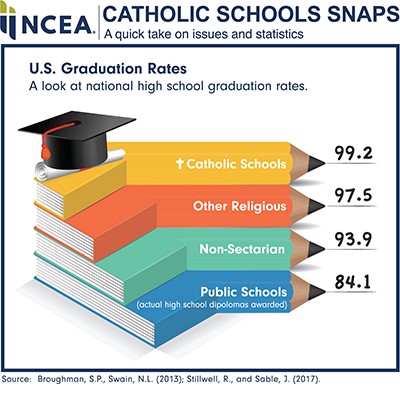Academic excellence is a hallmark of Catholic elementary and secondary schools in the Diocese of Wilmington. A closer look reveals that quality Catholic education, coupling a strong academic program with a firm faith foundation in all grades, is designed to prepare students to live in a diverse and changing world.
Religion – In Pre-Kindergarten through Grade 12 faith formation occurs daily through instruction and praxis. Students not only learn about the Catholic faith, but also engage in prayer, worship, and service to live the faith. The Religion curriculum in elementary school is built upon six key concepts:
- Knowledge of the Faith

- Liturgical Education
- Moral Formation
- Teaching to Pray
- Education for Community Life
- Missionary Initiation
In high school the core Religion curriculum follows the Curriculum Framework of the United States Conference of Catholic Bishops.
- The Revelation of Jesus Christ in Scripture
- Who Is Jesus Christ?
- The Mission of Jesus Christ (The Paschal Mystery)
- Jesus Christ’s Mission Continues in the Church
- Sacraments as Privileged Encounters with Jesus
- Life in Jesus Christ
Core Curriculum – Language Arts, Mathematics, Science, and Social Studies form the core curriculum areas in both elementary school and high school.
 Enrichment Curriculum – Physical Education, Technology, the Visual and Performing Arts, and World Language enhance the core curriculum in both the elementary school and high school.
Enrichment Curriculum – Physical Education, Technology, the Visual and Performing Arts, and World Language enhance the core curriculum in both the elementary school and high school.
National standards and state standards form the framework of every curriculum area in Catholic schools. These standards are infused with Catholic teaching, as appropriate to students’ age and grade level. Diverse instructional resources, including print, non-print, and technology, support instruction in national and state standards for learning.
Religion, Core Curriculum subjects, and Enrichment Curriculum subjects are developed in a model that incorporates 21st Century thinking skills.
- Critical thinking, problem solving, reasoning, analysis, interpretation, synthesizing information
- Research skills and practices, interrogative questioning
- Creativity, artistry, curiosity, imagination, innovation, personal expression
- Perseverance, self-direction, planning, self-discipline, adaptability, initiative

Assessment in elementary school and high school relies upon standardized testing, teacher-constructed assessments, and performance and project assessments. In elementary school students in Kindergarten through Grade 8 are assessed through Renaissance Star in Reading and Mathematics three times annually. In high school students in Grades 9, 10, and 11 take the College Board PSAT annually. Juniors and seniors take the College Board SAT, ACT, and Advanced Placement scholars take the College Board AP tests. These standardized measures assess students’ individual academic growth and compare their academic achievement with national and state benchmarks.

